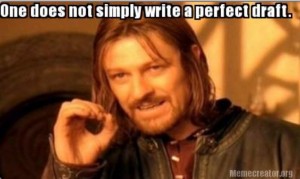 Moving on from my previous post about Die Hard, workshop etiquette and providing fictional/film examples, here’s what I’d say about The Imitation Game
Moving on from my previous post about Die Hard, workshop etiquette and providing fictional/film examples, here’s what I’d say about The Imitation Game. This is the problematic stuff, and would come later in the critique than the section where I praised the characterization, the weighty and worthwhile subject matter, and the general structure of the story, which holds together in a decently coherent fashion.
Hi, Graham and Morten,
PROBLEMATIC
- Though the story moves from beat to beat in a logical manner, and is effective in achieving the desired emotional effect, it lacks subtlety. The story feels heavy-handed, on the nose, as if the characters are bellowing slogans like, “War is bad!” and “It takes more than guns to win these things!” and “Look at this amazing maladjusted smart guy and all the people he saved!” and “Wow, isn’t it horrific and amazing that every day he and his band didn’t solve the problem, all sorts of people died?” I’m not saying it doesn’t work, but it’s fundamentally clunky.
- The details of your chosen historical period and the military/intelligence community are for the most part accurately rendered, but you have chosen to simplify the chain of command by making Turing and his guys seem responsible for an enormous swath of military action, including calling or cancelling bombing raids. I understand why simplifying is often a good choice, but it’s less interesting, in this case, than if you tried to hint at the complexity.
- Turing’s male sidekicks are somewhat slenderly characterized. They blend together in my mind, forming something of a multi-headed bully when they’re not on his side and a multi-headed cheerleader when they are. The only one who stands out at all is the fellow with a brother in the Navy. That’s less about characterization and more about the story attached to him.
- I’m not sure what I think of you showing us apple and cyanide during the story, foreshadowing the manner of Turing’s death, without explicitly saying that he poisoned himself. Apples have both Biblical and fairy-tale freight, and I wonder if you couldn’t do something more with this.
All of the above is clear and yet it’s respectfully worded. It’s not so “nice” that the intent is lost, but it doesn’t try to snark, show off my huge brain, or score points.
It would be easy to push that line, especially with the first item. I could simply add a touch of sarcasm to the sentences I use to illustrate the story’s various points. (Even if I tool the last one up slightly “Gee willikers, do you all get that every day Turing and his plucky band didn’t solve the problem, all sorts of people died?” the tone changes.)
The exercise here, if you missed the previous post, is to critique a movie that many people will have seen, as if it were actually a novel or short story submitted to one of my classes. It’s a chance to practice critique. And to get to say, “Dear Francis Ford Coppola, about this thingie you’ve written…” Which is just, I hope, fun.
Next in this series, we will discuss my deep and abiding hatred of the most recent X-Men movie.


